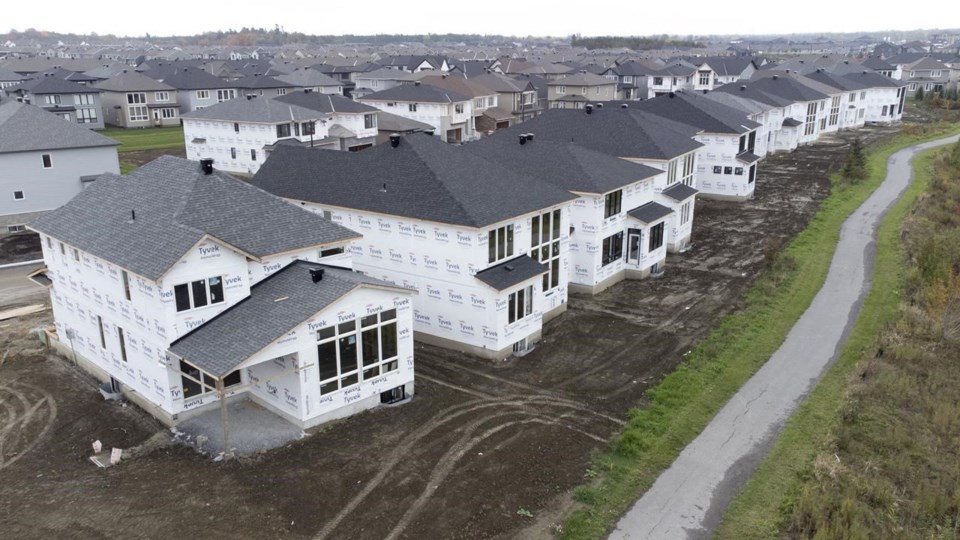TORONTO — Jeremy Kinnear is 23 and already thinking about home ownership.
Fresh out of university, the Edmontonian is in the midst of a four-year job program that will require him to move to Calgary halfway through. After that, he hopes to put down roots.
So when Kinnear got a call from his broker earlier this year about the new Tax-Free First Home Savings Account (FHSA), he was excited about taking advantage of the program.
"I'm pretty young, so I've been saving as much as I can right now. I need to invest young so that I can compound my money sooner," he said.
The rules governing the new program come into force April 1, allowing prospective homebuyers to start saving for up to 15 years once they open an account, with an annual $8,000 deposit cap and a lifetime contribution limit of $40,000.
But prospective homebuyers excited to start saving might not be able to open a FHSA as soon as they're hoping.
Eight large Canadian financial institutions, including all Big Six banks, EQ Bank and Desjardins said they would not be ready to offer the FHSA by April 1. Some said they are targeting a summer launch or aiming for "later in 2023," citing a complex process that requires technological development and co-ordination with the Canada Revenue Agency.
Ottawa has said it "expects that Canadians will be able to open and begin contributing to an account in mid-2023," though the budget tabled earlier this week noted the option is available to banks beginning April 1.
First proposed in the federal government's 2022 budget, the new account combines two perks from existing investment account types: tax-deductible contributions and tax-free withdrawals.
Similar to a registered retirement savings plan (RRSP), deposits can be claimed as a deduction against taxable income. Investments can then grow in the account without being subject to tax, followed by a tax-free withdrawal if used for a down payment — resembling a tax-free savings account (TFSA).
"The money goes in like an RRSP and it comes out like a TFSA," said Erica Nielsen, executive vice-president of banking and investments at RBC.
"I anticipate it being an exceptionally popular choice because for somebody who is starting to save — and whether you're starting to save for home ownership or you're starting to save for retirement — it has really become the right place to save."
Nielsen said RBC clients should be able to open FHSA accounts sometime this spring.
For FHSA accounts, unlike an RRSP or TFSA, the contribution room only starts once the account is open.
Individuals are allowed to carry forward unused portions of their annual contribution limit into a subsequent year, on top of the $8,000 available for that future year.
Any savings not used to purchase a home could be transferred on a tax-free basis into an RRSP or a Registered Retirement Income Fund.
Tony Sutey, senior financial adviser at Assante Capital Management Ltd. in Huntsville, Ont., said once the program is available, it will be "a no-brainer for someone who is seriously looking at buying their first home."
"That's mostly young people, but it can also be adults in their 40s or 50s if they've never had a home," he said.
But he advised the program might not be the right fit for everybody, including those with lower incomes.
"There are certain people that may dream of owning their first home, but financially, it would be risky to use this product and I would probably lean toward a tax-free savings account," Sutey said.
"Someone who's got a fairly low income, let's say it's $40,000, $50,000 or less, that person is not an ideal candidate because they might need money to fix their car or whatever it is. Then you have to worry about drawing money out and paying tax on it."
Kinnear said he plans to contribute the maximum annual amount of $8,000 to his FHSA once eligible. He said $40,000 over five years may seem like a drop in the bucket to afford a home, but it's a start.
"Even if I never end up buying a house, the future value of that extra cash ... is still significant," he said.
"I'm going to have to save way more than just $40,000 to buy a down payment. But at the end of the day, it's extra cash in hand."
This report by The Canadian Press was first published March 30, 2023.
Sammy Hudes, The Canadian Press



